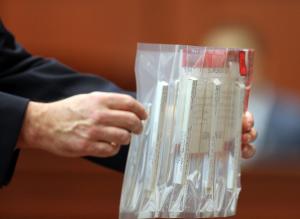April 3 (UPI) — The California Supreme Court on Monday held up a controversial state law that allows law enforcement officers to take DNA from anybody arrested or charged with a felony.
In a 4-3 vote, the court ruled in favor of the law, which has allowed California law enforcement officials to create a DNA database of tens of thousands of people who were arrested but never charged or convicted.
The law was challenged by privacy advocates, including the Electronic Frontier Foundation, which argued the state’s constitution “prohibits the collection of DNA from arrestees because of the severe impact DNA collection has on our right to privacy.”
But the case had several other components and Justice Leondra R. Kruger, who voted to let the law stand, said the DNA collection could still be challenged, the San Diego Union-Tribune reported.
The three judges who voted to strike down the law said the case was an opportunity to get rid of a program that allows the state to retain and search a DNA database full of people never convicted of a crime.
“A DNA sample stored by the state contains an arrestee’s entire genetic code — information that has the capacity to reveal the individual’s race, biological sex, ethnic background, familial relationships, behavioral characteristics, health status, genetic diseases, predisposition to certain traits, and even the propensity to engage in violent or criminal behavior,” wrote Justice Mariano-Florentino Cuéllar, adding that the program “is a far more significant invasion of an arrestee’s privacy.”
After the ruling, Carrie Braun, a spokeswoman for the Orange County Sheriff’s Department, spoke in favor of the law.
“The collection of this DNA, done through a minimally invasive cheek swab during booking in Orange County Jail, has aided the Sheriff’s Department in investigations by providing evidence that may lead to potential conviction for past crimes, similar to the use of fingerprints or photographs,” Braun said.

COMMENTS
Please let us know if you're having issues with commenting.